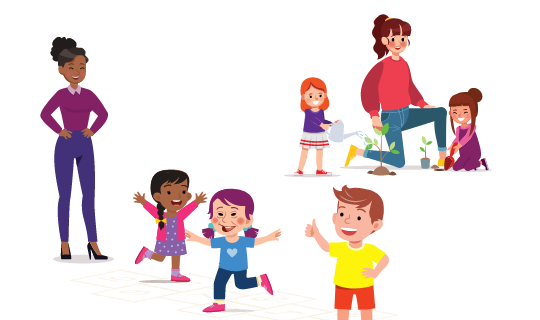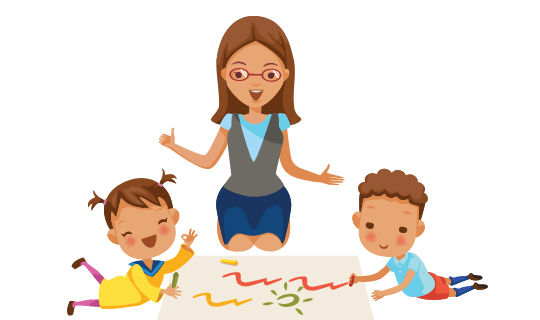Targeted Supports
AIM targeted supports cater to a wide range of abilities and are focused on the needs of the child and do not need a diagnosis of disability. For many children, AIM universal supports will be sufficient to ensure inclusion. However, some children may require one or more further supports to ensure that they can participate meaningfully in the ECCE (Early Childhood Care and Education) programme.
These might take the form of specialist advice and support, specialist equipment or appliances, minor building alterations, therapeutic intervention or, in a small number of cases, extra assistance in the pre-school room.
While AIM does not fund Special Needs Assistants (SNAs), in some cases funding may be provided either to reduce the child-to-adult ratio in the pre-school room or to fund an extra staff member as a shared resource with other children in the ECCE setting.
If you would like information on applying for targeted supports you can visit our How to Apply page or for further information on support see below.
Level 4: Expert Educational Advice and Support
AIM level 4 is delivered by the Better Start Early Years Specialist Service (EYSS). Early Years Specialists work collaboratively with parents, pre-school providers, and with other professionals to develop inclusive learning environments in pre-schools. The EYSS also provides coaching and mentoring to the pre-school staff on supporting children in the ECCE programme. This includes the creation of an Access and Inclusion Plan for children, which can help identify additional support and resources required to meet the needs of the child in the pre-school room. The EYSS can also act as a liaison with the National Council for Special Education to support transitions to primary school.
If a child needs additional assistance to meaningfully participate in pre-school, the EYSS can give advice about applying for other targeted supports. For more information on the role of the EYSS in the application process visit the How to Apply section on this website.
“Throughout the AIM application process I was involved in discussions between my childcare service provider, Better Start. Our Early Years Specialist was available to answer any questions.”
– Emma Mooney, Parent
Level 4 Key Documents
- My Inclusion plan
- Informed Consent (PDF)
- AIM Privacy Statement 2022 (PDF)
- Access and Inclusion Profile Rationale (PDF)
- Access and Inclusion Profile and Guidance (PDF)
Level 5: Equipment, Appliances and Minor Alterations
Under level 5, AIM can provide specialised equipment, appliances or capital grants towards minor building alterations to ensure a child’s meaningful participation in pre-school. This could include a hoist, hearing aid or wheelchair ramp to name a few examples. Training in the use of equipment will be given to providers free of charge. More information on what is available under level 5 can be found below.
”I have nothing but good things to say about AIM. There is a child with a physical disability in my pre-school, through AIM level 5 I was able to get a changing area and a path installed so the child can move freely throughout the centre. Allowing this child to participate actively in an outdoor setting has helped his physical and social development greatly”.
-Katie Glynn, Willow Outdoor Pre-school, Roscommon
Level 5 Key Documents
- Capital Information (PDF)
- Sample List of Eligible Equipment (PDF)
- Capital Checklist (PDF)
- Capital-Sample Application Form (PDF)
- Capital Recommendation Template to be completed by NCSE Visiting Teacher (PDF)
- AIM Capital Form for HSE and HSE funded Professional’s (PDF)
- Informed Consent (PDF)
Level 6: Therapy Services
AIM provides a range of services in collaboration with the HSE under therapeutic supports. These services can be either universal or targeted. Universal services are the provision of leaflets or other supporting information. Targeted services are individualised and could include; behaviour support plans, classes, equipment, professional advice or pre-school visits. Supports may be provided through a Children’s Disability Network Team (CDNT), HSE Disability Service, HSE funded Voluntary Organisation or HSE Primary Care Services.
When an application for AIM level 6 support is submitted, a Better Start Early Years Specialist is put in touch with the appropriate HSE contact, who will advise on the best support for the child.
If a child is already known to the HSE, the Early Years Specialist will arrange a phone call with the HSE contact identified on the Access and Inclusion Profile. They will then review healthcare strategies already in place for that child so that they can reinforce these strategies with the pre-school and ensure there is no conflict of information for the child or pre-school.
If a child is not known to the HSE, the Early Years Specialist will send the completed Access and Inclusion Profile to the agreed HSE contact. The HSE will be required to respond within 5 weeks of the request for support so the child can optimally participate in the ECCE programme.
Level 7: Additional Capitation
AIM level 7 support provides additional funding to pre-schools who have a child requiring extra support. Providers can use this funding either to reduce the child-to-adult ratio in the pre-school room or to fund an extra staff member as a shared resource with other children in the ECCE setting. This is all centred on supporting the pre-school leader to ensure your child’s optimal participation. A simple reduction in the staff to child ratio can have hugely positive outcomes for children with disabilities as well as for the entire pre-school room. For more information read: Additional Assistance Information (PDF).
“I was awarded AIM level 7 for a child in my pre-school with a physical disability. This has allowed the child to participate in all activities with the other children, this has made the whole pre-school experience for this child and the other children seamless. Allowing this child to participate actively in an outdoor setting has helped his physical and social development greatly”
Katie Glynn, Willow Outdoor Pre-school, Roscommon
In recognition of research in this area, this support is designed to improve inclusion and ensure meaningful participation of all children in the room. It is different to the Special Needs assistant model which targets supports at each individual child.
A rate of €240 per week additional Assistance can be paid to settings from September 2022. (This is based on 15 hours a week of additional assistance for a 38 week term, variations are calculated pro rata.)
The lower staff to child ratios allowed for flexibility on a day to day bases and my son has become much more vocal and verbal during his first year of AIM support”.
Emma Mooney, Parent



